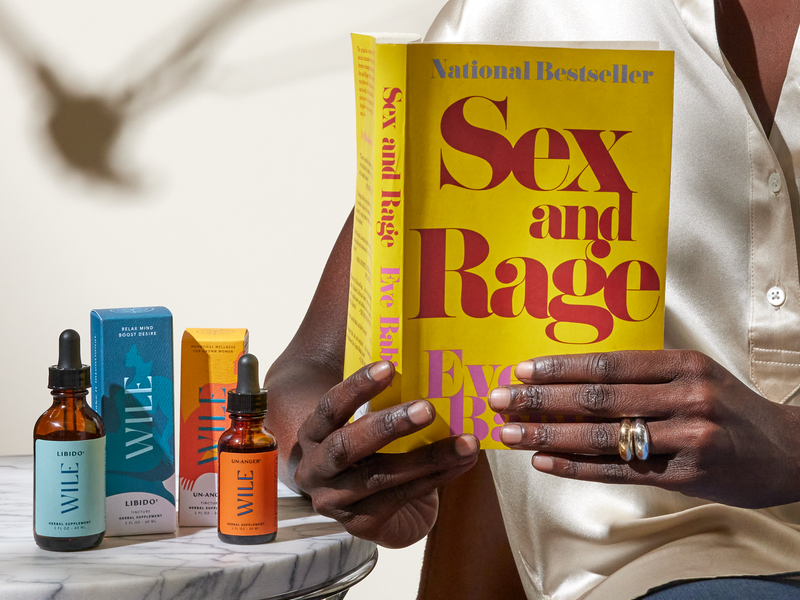This Plant is the Calm in the Storm
The passionflower vine is full of drama. First, it twines around and climbs up structures in gorgeous and bewildering shapes. And the fruits! If you’ve never eaten a fresh passion fruit, we recommend its deliciously bright and tart flavor, as well as the experience of cracking one open and slurping out the pulpy, seedy insides. But for us, the passionflower itself is the real star of the show. It has petals and sepals that bend backward, lots of threadlike curling magenta and white filaments, and an intricate reproductive system in the middle.
Most importantly, passionflower is an effective calming agent and anti-stress ingredient. There’s something poetic about a force for calm coming from such a theatrical plant. Whether you’re living a drama right now or just navigating the rigors of the average overfunctioning woman over 40, passionflower can bring its serenity to your life, too.
Why We Love Passionflower
- Mounting evidence suggests that passionflower is an effective anti-stress herb that can relieve symptoms of occasional anxiety. One study even compared passionflower to a common anxiety medication called oxazepam and found that while passionflower took longer to kick in, its effects were comparable to the pharmaceutical (minus the side effects).
- While passionflower’s primary effects are calm and relaxation, there’s also evidence that it may soothe hot flashes and other menopause symptoms. To this we say yes please! We love a multitasker.
Key Benefits:
Reduces stress and occasional anxiety - passionflower has long been used to lower stress and occasional anxiety, and scientists are now putting together theories to explain why it’s so effective. The current hypothesis is that it increases levels of an amino acid called GABA, and GABA in turn quiets the central nervous system.
Promotes healthy sleep - calming your nervous system is a tried and true way to prepare your body for relaxing, restorative sleep. The GABA promoting properties in passionflower help calm your body and mind for better quality sleep.
Maybe perimenopause? - Many women claim that passionflower supports menopause symptoms like hot flashes anger, and headache. While more research is necessary to investigate these claims, it fits perfectly into our women 40+ wheelhouse.
Traditional Uses:
Passion flower has been used by native South American people as a sedative. In the 16th century colonists brought passionflower back to Europe, where it became integrated into European folk medicine.
About the Plant:
Well, if the opener to this post didn’t get you: Passionflower is the flower of the delicious and tropical passion fruit. Passionflower grows on a woody climbing vine and is native to Central and South America, as well as the land that is now the Southeastern United States.
Found In (Wile Products)
Things to Know about Passionflower:
Passionflower is safe for most people, but like many potent herbs has the potential to interact with some medicines. If you’re taking a prescriptive sedative don’t add passionflower to the mix or you may get too relaxed. Also, those taking blood thinners should use passionflower cautiously because it may increase blood clotting time.
Passionflower is not recommended for pregnant people.
Clinical Research
- Akhondzadeh, Shahin, Hamid Reza Naghavi, M. Vazirian, A. Shayeganpour, H. Rashidi, and M Khani. “Passionflower in the Treatment of Generalized Anxiety: A Pilot Double-Blind Randomized Controlled Trial with Oxazepam.” Journal of Clinical Pharmacy and Therapeutics 26, no. 5 (October 30, 2001): 363–67. https://doi.org/10.1046/j.1365-2710.2001.00367.x.
- Akhondzadeh, Shahin, Ladan Kashani, M Mobaseri, Seyed Hamzeh Hosseini, S Nikzad, and M Khani. “Passionflower in the Treatment of Opiates Withdrawal: A Double-Blind Randomized Controlled Trial.” Journal of Clinical Pharmacy and Therapeutics 26, no. 5 (October 30, 2001): 369–73. https://doi.org/10.1046/j.1365-2710.2001.00366.x.
- Fahami, Fariba, Zahra Asali, Abolfazl Aslani, and Nahid Fathizadeh. “A Comparative Study on the Effects of Hypericum Perforatum and Passion Flower on the Menopausal Symptoms of Women Referring to Isfahan City Health Care Centers.” Iranian Journal of Nursing and Midwifery Research, January 1, 2010.
- Miyasaka, Lincoln Sakiara, Álvaro Nagib Atallah, and Bernardo Garcia De Oliveira Soares. “Passiflora for Anxiety Disorder.” The Cochrane Library, January 24, 2007. https://doi.org/10.1002/14651858.cd004518.pub2.
Sources
- Allen, Mary J. “GABA Receptor.” StatPearls - NCBI Bookshelf, February 17, 2022. https://www.ncbi.nlm.nih.gov/books/NBK526124/#:~:text=Gamma%2Daminobutyric%20acid%20(GABA),excitability%20by%20inhibiting%20nerve%20transmission.
- Mount Sinai Health System. “Passionflower,” n.d. https://www.mountsinai.org/health-library/herb/passionflower.
- NCCIH. “Passionflower,” n.d. https://www.nccih.nih.gov/health/passionflower.
Image Credit: Colin Davis via Unsplash
This article is intended for informational purposes and is not intended to replace a one-on-one medical consultation with a professional. Wile, Inc researches and shares information and advice from our own research and advisors. We encourage every woman to research, ask questions and speak to a trusted health care professional to make her own best decisions.




